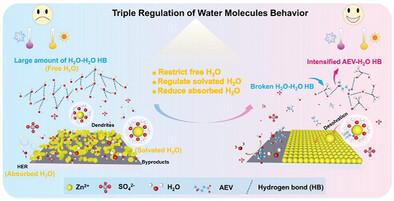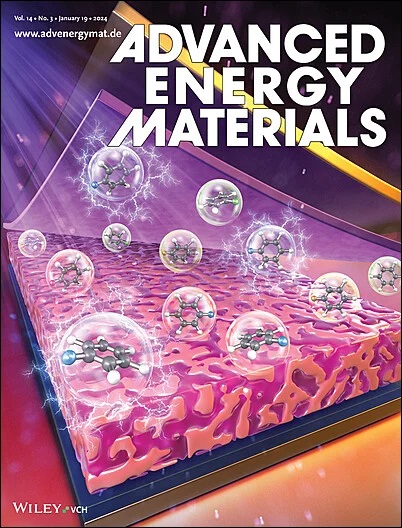Triple Regulation of Water Molecules Behavior to Realize High Stability and Broad Temperature Tolerance in Aqueous Zinc Metal Batteries via a Novel Cost-Effective Eutectic Electrolyte
IF 24.4
1区 材料科学
Q1 CHEMISTRY, PHYSICAL
引用次数: 0
Abstract
The high activity of water in aqueous electrolyte causes drastic side reactions on the Zn anodes, severely limiting the electrochemical performance of aqueous zinc metal batteries (AZMBs) under extreme conditions. Herein, levulinic acid is developed as the hydrated deep eutectic solvent (DES), to build a novel non-flammable and cost-effective ZnSO4-based eutectic electrolyte with triple regulation of water molecules behavior, enabling highly stable AZMBs over a wide temperature. In situ experiments, molecular dynamics simulations, and spectroscopy analysis jointly reveal that the DES is capable of comprehensively lowering the water activity by simultaneously controlling the behavior of the free, solvated, and interfacial water molecules within the eutectic electrolyte system. Consequently, the Zn anodes exhibit ultralong cycling stability (4500 h at 1 mA cm−2/1 mA h cm−2), decent Coulombic efficiency of 99.39%, and excellent temperature tolerance (−20–50 °C). Notably, the designed 2.0 Ah Zn//VOX pouch cell exhibits a recorded actual energy density of 37.46 Wh Kg−1 and 95.38 Wh L−1 at the whole cell level, with a remarkable capacity retention of 81.01% after 150 cycles, demonstrating the potential for scale-up into real AZMBs. This work provides an in-depth understanding of the correlation between the water molecule behavior and electrochemical properties of AZMBs.

求助全文
约1分钟内获得全文
求助全文
来源期刊

Advanced Energy Materials
CHEMISTRY, PHYSICAL-ENERGY & FUELS
CiteScore
41.90
自引率
4.00%
发文量
889
审稿时长
1.4 months
期刊介绍:
Established in 2011, Advanced Energy Materials is an international, interdisciplinary, English-language journal that focuses on materials used in energy harvesting, conversion, and storage. It is regarded as a top-quality journal alongside Advanced Materials, Advanced Functional Materials, and Small.
With a 2022 Impact Factor of 27.8, Advanced Energy Materials is considered a prime source for the best energy-related research. The journal covers a wide range of topics in energy-related research, including organic and inorganic photovoltaics, batteries and supercapacitors, fuel cells, hydrogen generation and storage, thermoelectrics, water splitting and photocatalysis, solar fuels and thermosolar power, magnetocalorics, and piezoelectronics.
The readership of Advanced Energy Materials includes materials scientists, chemists, physicists, and engineers in both academia and industry. The journal is indexed in various databases and collections, such as Advanced Technologies & Aerospace Database, FIZ Karlsruhe, INSPEC (IET), Science Citation Index Expanded, Technology Collection, and Web of Science, among others.
 求助内容:
求助内容: 应助结果提醒方式:
应助结果提醒方式:


